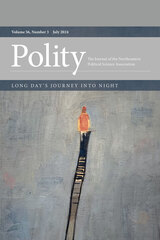7 start with P start with P

From the Great Panathenaea of ancient Greece to the hajj of today, people of all religions and cultures have made sacred journeys to confirm their faith and their part in a larger identity. This book is a fascinating guide through the vast and varied cultural territory such pilgrimages have covered across the ages. The first book to look at the phenomenon and experience of pilgrimage through the multiple lenses of history, religion, sociology, anthropology, and art history, this sumptuously illustrated volume explores the full richness and range of sacred travel as it maps the cultural imagination.
The authors consider pilgrimage as a physical journey through time and space, but also as a metaphorical passage resonant with meaning on many levels. It may entail a ritual transformation of the pilgrim's inner state or outer status; it may be a quest for a transcendent goal; it may involve the healing of a physical or spiritual ailment. Through folktales, narratives of the crusades, and the firsthand accounts of those who have made these journeys; through descriptions and pictures of the rituals, holy objects, and sacred architecture they have encountered, as well as the relics and talismans they have carried home, Pilgrimage evokes the physical and spiritual landscape these seekers have traveled. In its structure, the book broadly moves from those religions--Judaism, Christianity, and Islam--that cohere around a single canonical text to those with a multiplicity of sacred scriptures, like Hinduism and Buddhism. Juxtaposing the different practices and experiences of pilgrimage in these contexts, this book reveals the common structures and singular features of sacred travel from ancient times to our own.
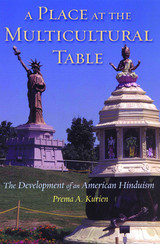
In A Place at the Multicultural Table, Prema A. Kurien shows how various Hindu American organizations--religious, cultural, and political--are attempting to answer the puzzling questions of identity outside their homeland. Drawing on the experiences of both immigrant and American-born Hindu Americans, Kurien demonstrates how religious ideas and practices are being imported, exported, and reshaped in the process. The result of this transnational movement is an American Hinduism--an organized, politicized, and standardized version of that which is found in India.
This first in-depth look at Hinduism in the United States and the Hindu Indian American community helps readers to understand the private devotions, practices, and beliefs of Hindu Indian Americans as well as their political mobilization and activism. It explains the differences between immigrant and American-born Hindu Americans, how both understand their religion and their identity, and it emphasizes the importance of the social and cultural context of the United States in influencing the development of an American Hinduism.

"Williams provides a thought-provoking overview of popular religion in America that will intrigue specialist and student alike. . . . He has both answered many questions and raised important new ones on the nature and development of American popular religion." --Journal for the Scientific Study of Religion
"Pioneering. . . . I for one am glad he combined scholarship and chutzpah for this modestly immodest first word." --Catholic Historical Review

This volume of the Building Bridges Seminar, Power: Divine and Human, Christian and Muslim Perspectives, comprises pairs of essays by Christians and Muslims which introduce texts for dialogical study, plus the actual text-excerpts themselves.
This new book goes far beyond mere reporting on a dialogical seminar; rather, it provides guidance and materials for constructing a similar dialogical experience on a particular topic. As a resource for comparative theology, Power: Divine and Human is unique in that it takes up a topic not usually explored in depth in Christian-Muslim conversations. It is written by scholars for scholars. However, in tone and structure, it is suitable for the non-specialist as well. Students (undergraduate and graduate), religious leaders, and motivated non-specialists will find it readable and useful. While it falls solidly in the domain of comparative theology, it can also be used in courses on dialogical reading of scripture, interreligious relations, and political philosophy.
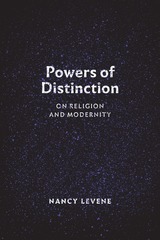
In readings from Abraham to the present, Levene recovers this richer dualism in its difference from the alternatives—other dualisms, nondualism, multiplication. From Abraham we get the biblical call to give up tribal belonging for a promised land of covenantal relation. Yet modernity, inclusive of this call, is also the principle that critiques the promise when it divides self from other, us from them.
Drawing on a long tradition of thinkers and scholars even as she breaks new ground, Levene offers here nothing less than a new way of understanding modernity as an ethical claim about our world, a philosophy of the powers of distinction to include rather than to divide.
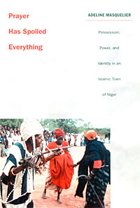
To explore the role of bori possession in local definitions of history, power, and identity, Masquelier spent a total of two years in Niger, focusing on the diverse ways in which spirit mediums share, transform, and contest a rapidly changing reality, threatened by Muslim hegemony and financial hardship. She explains how the spread of Islam has provoked irreversible change in the area and how prayer—a conspicuous element of daily life that has become virtually synonymous with Islamic practice in this region of west Africa—has thus become equated with the loss of tradition. By focusing on some of the creative and complex ways that bori at once competes with and borrows from Islam, Masquelier reveals how possession nonetheless remains deeply embedded in Mawri culture, representing more than simple resistance to Islam, patriarchy, or the state. Despite a widening gap between former ways of life and the contradictions of the present, it maintains its place as a feature of daily life in which villagers participate with varying degrees of enthusiasm and approval.
Specialists in African studies, in the anthropology of religion, and in the historical transformations of colonial and postcolonial societies will welcome this study.
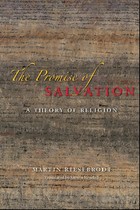
Why has religion persisted across the course of human history? Secularists have predicted the end of faith for a long time, but religions continue to attract followers. Meanwhile, scholars of religion have expanded their field to such an extent that we lack a basic framework for making sense of the chaos of religious phenomena. To remedy this state of affairs, Martin Riesebrodt here undertakes a task that is at once simple and monumental: to define, understand, and explain religion as a universal concept.
Instead of propounding abstract theories, Riesebrodt concentrates on the concrete realities of worship, examining religious holidays, conversion stories, prophetic visions, and life-cycle events. In analyzing these practices, his scope is appropriately broad, taking into consideration traditions in Judaism, Christianity, Islam, Buddhism, Daoism, and Shinto. Ultimately, Riesebrodt argues, all religions promise to avert misfortune, help their followers manage crises, and bring both temporary blessings and eternal salvation. And, as The Promise of Salvation makes clear through abundant empirical evidence, religion will not disappear as long as these promises continue to help people cope with life.
READERS
Browse our collection.
PUBLISHERS
See BiblioVault's publisher services.
STUDENT SERVICES
Files for college accessibility offices.
UChicago Accessibility Resources
home | accessibility | search | about | contact us
BiblioVault ® 2001 - 2024
The University of Chicago Press




